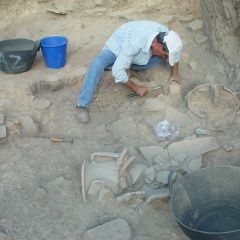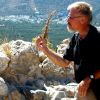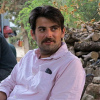Duke-UNC Archaeology Network

2013 to 2014
Emerging Networks
Professor Carla Antonaccio and PhD candidate Timothy Shea are collaborating with Professor Donald Haggis and PhD candidates Cicek Beeby and Catharine Judson of the University of North Carolina-Chapel Hill to implement the first Duke-UNC Archaeological Field Practicum and to further develop the Duke-UNC Consortium for Classical and Mediterranean Archaeology (CCMA).
To study and practice archaeology, fieldwork is the sine qua non. Archaeological fieldwork by academic researchers used to make extensive use of local labor, but vertically integrated teams of students and faculty are now an essential aspect of teaching and research. The fieldwork depends on undergraduates who are trained in the field, with the collaboration of graduate students (who themselves often began as undergrad trainees), local colleagues, and an inter-institutional team of scholars and specialists.
Participating in an archaeological field project is the way to gain a ground-up understanding of how a given site fits into its local past and present landscape, economy, and society. To truly integrate this perspective into the teaching of archaeology at Duke, this project is intended to jump-start a wider integration of undergraduate and graduate training and, ultimately, research, and to do so by leveraging the resources at both Duke and Carolina. The idea is that the undergraduates and graduate students will be able both to integrate their home campus classroom experience with fieldwork and to develop their own research agendas out of these experiences. During summer 2013, the field school will be held at at Azoria on Crete, where Professor Haggis has worked extensively. In future years it is hoped that this framework could be extended to other projects in other places (e.g. Turkey and Italy) where Duke faculty work.
In the fall of 2013, Professors Antonaccio and Haggis will teach courses that will be enriched by the field work - and they will participate in the teaching of each others' courses. In addition they will initiate a series of formal lectures and a student-oriented symposium, with undergraduate and graduate students reporting on their experiences (student records form an essential part of the permanent documentation of the site). They plan to link this to a weekend workshop involving the senior staff of the project, both local and from other institutions, which will provide an invaluable chance to discuss results and publication, as well as plan for the next season away from the pressures of the field project itself.
People
|
Professor of Archaeology |
Professor of Classical Archaeology Nicholas A. Cassas Term Professor of Greek Studies |
PhD Student in Classical Studies |



